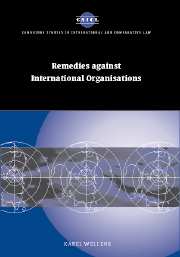Book contents
- Frontmatter
- Contents
- Acknowledgements
- List of abbreviations
- Introduction
- Part I General features of remedies against international organisations
- Part II Procedural aspects of remedial action against international organisations
- Part III Substantive outcome of remedial action against international organisations
- Part IV Alternative remedial action against international organisations and options for the future
- 16 Introduction to alternative remedial action against international organisations and options for the future
- 17 Pre-remedial action
- 18 Non-legal alternative remedial action
- 19 Amendment of existing judicial remedies
- 20 An inevitable role for the International Court of Justice
- Conclusion
- Bibliography
- Index
- CAMBRIDGE STUDIES IN INTERNATIONAL AND COMPARATIVE LAW
19 - Amendment of existing judicial remedies
Published online by Cambridge University Press: 13 July 2009
- Frontmatter
- Contents
- Acknowledgements
- List of abbreviations
- Introduction
- Part I General features of remedies against international organisations
- Part II Procedural aspects of remedial action against international organisations
- Part III Substantive outcome of remedial action against international organisations
- Part IV Alternative remedial action against international organisations and options for the future
- 16 Introduction to alternative remedial action against international organisations and options for the future
- 17 Pre-remedial action
- 18 Non-legal alternative remedial action
- 19 Amendment of existing judicial remedies
- 20 An inevitable role for the International Court of Justice
- Conclusion
- Bibliography
- Index
- CAMBRIDGE STUDIES IN INTERNATIONAL AND COMPARATIVE LAW
Summary
The non-legal alternative remedial mechanisms that are reviewed in the preceding chapter not only provide remedial opportunities at the first level of accountability, but they may also trigger mechanisms at the second and third levels as a result of their findings. The Ombudsman and the Inspection Panel are in fact available to (small groups of) individual claimants or requesters – the adverse material effect of acts or omissions of the organisation is not an eligibility requirement for access to an ombudsman who, moreover, may also be resorted to by staff members, either in their personal claims or in their capacity as whistleblowers in cases of maladministration in the public interest. Although individual grievances could be at the root of Commissions of Inquiry, it is more likely that they will normally only be set up in the case of events and actions occurring on a larger scale – for example, within the context of complex operational activities – and the initiative would most likely come from the organisation's Executive Head in close consultation with one of its principal organs or from these organs themselves: pressure from member states and from civil society at large does (potentially) play an important role in this respect.
The analysis as to the second and third levels of accountability carried out in the previous Parts of this study has brought to light various deficiencies from a remedial point of view as far as the different categories of state and non-state entities filing a claim against an international organisation are concerned.
- Type
- Chapter
- Information
- Remedies against International Organisations , pp. 198 - 223Publisher: Cambridge University PressPrint publication year: 2002



